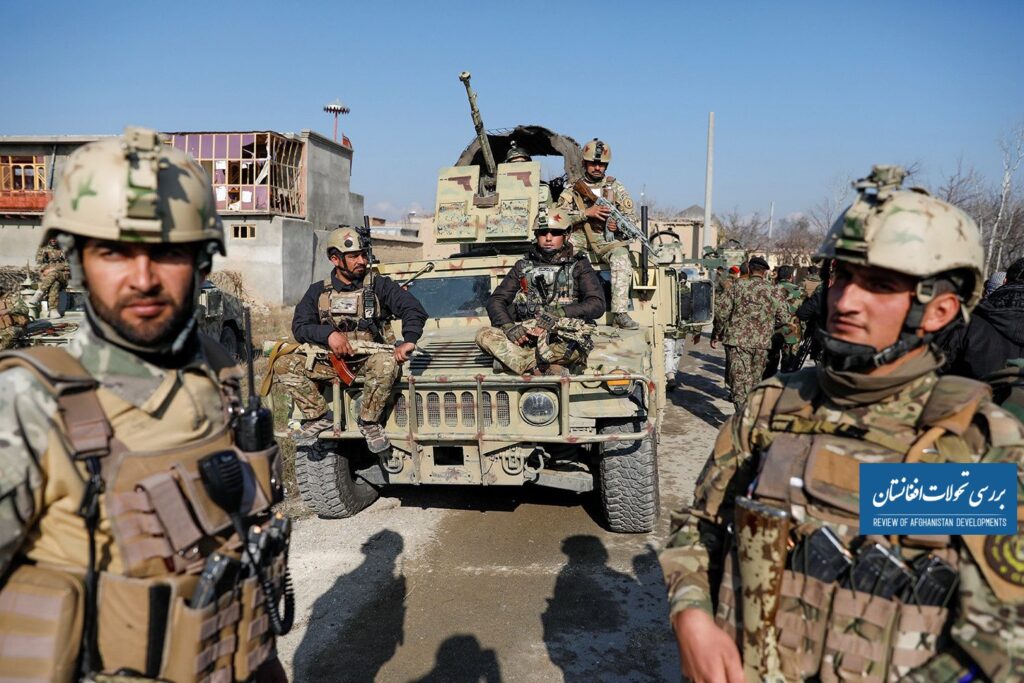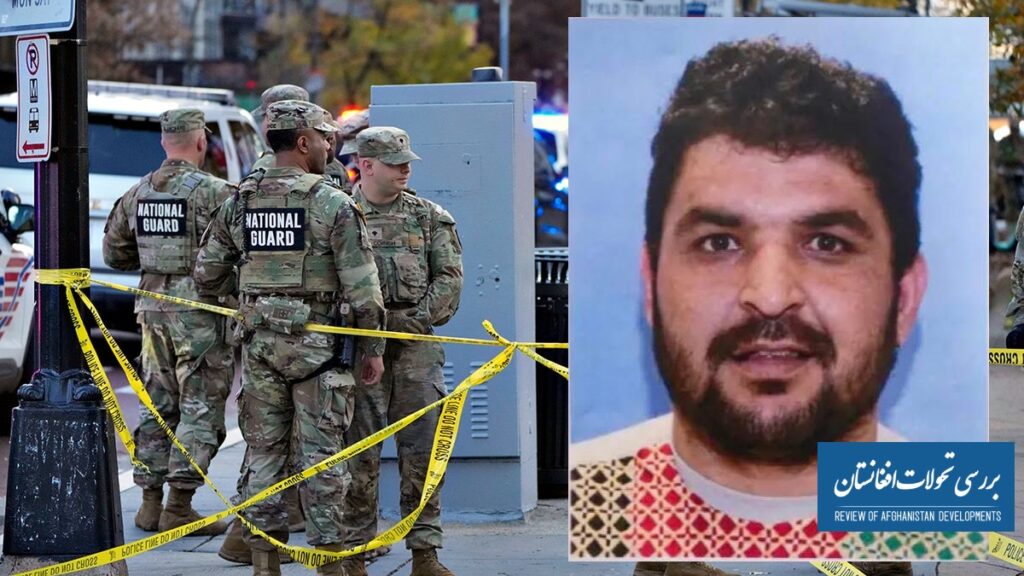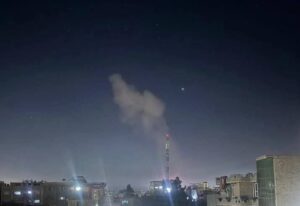Review of Afghanistan developments
In a security incident occurring close to the White House, an Afghan individual identified as Rahmanullah Lakanwal fatally shot two members of the US National Guard. This news has attracted significant media attention both in the United States and internationally. This article examines the repercussions of this assault on the Afghan refugee community within the US, in addition to the potential impact on US policy regarding Afghanistan, particularly if the assailant is found to have connections to terrorist organizations.
Who is Rahmanullah Lakanwal?
According to the information available, Rahmanullah Lakanwal, aged 29, hailed from Khost province and served in the Afghan army’s special forces (Zero-1 Unit). Following the fall of Kabul in 2021, Lakanwal emigrated from Afghanistan to the United States. This move was facilitated by a program known as “Operation Welcoming Allies,” utilizing the SIV visa, which was granted by the Joe Biden administration to Afghan soldiers and individuals facing threats. After the expiration of his visa, he sought asylum in 2024, which was subsequently approved by the Trump administration in April 2025, allowing him to reside in the United States.
Is the Lakanwal attack an organized terrorist act?
Donald Trump has labeled the attack as terrorist; however, local officials in Washington have stated that the FBI is looking into the incident as a possible terrorist act. From the American viewpoint, it is crucial to ascertain whether this was an individual act or one orchestrated by a group. Currently, there has been no statement regarding Rahmanullah Lakanwal’s affiliations with terrorist organizations or groups, and his motive for this act remains ambiguous. Nevertheless, there are allegations suggesting a suspicion of terrorism related to the incident. Reports indicate that he uttered “Allahu Akbar” prior to the shooting, initiating the attack in this manner. Furthermore, the attack has been characterized as “targeted,” implying that it was premeditated. However, we must await the investigation’s findings to clarify the motive behind this act.

Effects on the circumstances of Afghan refugees residing in the United States
The initial outcome of Rahmanullah Lakanwal’s assault on the US National Guard will be a more stringent US policy regarding the acceptance of Afghan refugees. This action will lead to a more rigorous program for admitting former US military associates and other Afghan refugees awaiting entry into the US, which number in the thousands, potentially resulting in a halt to the program. The subsequent consequence involves the vetting of Afghan refugees residing in the US who arrived with SIV visas. Following this incident, Trump has mandated a reassessment of the records of immigrants who entered the US in 2021. He stated in a communication on the Truth Network: The US must reevaluate all Afghans who entered the US during the administration of the previous president, Joe Biden. US Secretary of Homeland Security Christie Noem has also characterized the attack as a failure of “unreviewed” immigration policies. Consequently, it is plausible that under the Trump administration, which is critical of immigrant acceptance, particularly Afghan refugees, under the “Operation Welcoming Allies” initiative, thousands of Afghan immigrants currently in the United States may face deportation following screening, based on the slightest suspicion.
The National Resistance Front’s immature stance
In a rash and ill-considered move, Ali Maysam Nazari, the public relations officer for the National Resistance Front led by Ahmad Massoud, wrote on X-Net after condemning the attack, “It seems that terrorist Rahmanullah Lakanwal is directly connected to the Taliban and their extended circle. Since 2021, we have continuously warned that the Taliban are sending people affiliated with their network and other terrorist groups to Western countries with the aim of carrying out such attacks.” Although this position of his is a sign of using any opportunity for “Talibanphobia,” it is not in the honor of the “public relations” officer of a front to take such a position without any evidence or proof. Especially since, according to published news, Lakanwal has collaborated with CIA forces in Afghanistan. Apart from this ill-considered comment, the consequences of instilling such ideas in public opinion are very serious for Afghan refugees living abroad, especially in the United States.
The impact of the attack on American politics
Should a connection be established between Rahmanullah Lakanwal and a terrorist organization like al-Qaeda or ISIS-K, the Trump administration might promptly alter US policy regarding Afghanistan. Up to this point, the assessment from the US intelligence community has indicated that a threat to US national security emanating from Afghanistan is improbable. However, if a relationship is identified between Rahmanullah Lakanwal and al-Qaeda or ISIS-K, the initial response from the US would be to counter the threat originating from Afghanistan.
Depending on the origin of the threat, whether it is al-Qaeda or ISIS-K, two scenarios are probable. Should the threat originate from al-Qaeda, considering Ayman al-Zawahiri’s presence in Kabul and his subsequent assassination via drone strike, the United States is expected to respond against the Taliban government. The spectrum of these responses may include bombings, drone strikes, and efforts to overthrow the regime.
However, if Rahmanullah Lakanwal is linked to ISIS Khorasan, the circumstances will change, as ISIS poses a threat to both nations. In such a scenario, the security collaboration between the Taliban government and the United States could be prioritized, leading to a thaw in the Kabul-Washington relations.
Related Articles
Consequences of Trump’s approach to the Taliban
Analysis of the American Delegation’s Visit to Afghanistan
Conclusion
The shooting of two National Guard soldiers by Rahmanullah Lucknowal near the White House holds considerable significance for various reasons. Firstly, this security incident took place in close proximity to the White House. Secondly, the attack targeted a National Guard unit, which has sparked debates among U.S. officials regarding its deployment and utilization. Lastly, the nationality of the attacker is noteworthy, as he is an Afghan refugee, and there are ongoing discussions within the United States concerning the acceptance of such individuals.
The consequences of Rahmanullah Laknawal’s actions on Afghan society and the nation are significant from two angles. Firstly, this action is poised to adversely affect Afghan refugees residing in the United States. The surge in deportations of Afghan refugees from the United States is likely to escalate. Initially, those who are undocumented will be targeted, followed by refugees whose files raise even the slightest suspicion, with their numbers projected to be in the thousands. The second aspect of the impact hinges on whether Rahmanullah Laknawal has affiliations with terrorist organizations such as Al-Qaeda and ISIS Khorasan; associations with either group will yield distinct repercussions.
Considering that, based on various US military and security sources, this Afghan individual conducted this attack independently, the repercussions of this act will probably only impact the Afghan refugee community residing in the United States.

















